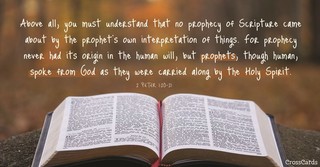- Recent Translations
- All Translations
2 Peter 1:4
Share
Settings
2 Peter 1:4 Meaning and Commentary
Whereby are given unto us
Or "by which", that is, glory and virtue; by the glorious power of Christ, or by the glorious and powerful Gospel of Christ; and so the Arabic version renders it, "by both of which"; or "by whom", as the Vulgate Latin version reads; that is, by Christ; for as in him are all the promises of God, so they are at his dispose, and by him are given unto the saints:
exceeding great and precious promises;
meaning the promises of the new and everlasting covenant, of which Christ is the Mediator, surety, and messenger; and which are "exceeding great", if we consider the author of them, who is the great God of heaven and earth, and who was under no obligation to make promises of anything to his creatures; and therefore must arise from great grace and favour, of which they are largely expressive, and are like himself; are such as become his greatness and goodness, and are confirmed by his oath, and made good by his power and faithfulness: and they are also great, as to the nature and matter of them; they are better promises than those of the covenant of works; they are not merely temporal ones, nor are they conditional and legal; but as they relate to things spiritual and eternal, to grace here and glory hereafter, so they are absolute, free, and unconditional, and are irreversible and unchangeable; and they answer great ends and purposes, the glory of God, and the everlasting good and happiness of his people; and therefore must be "precious", of more value and worth than thousands of gold and silver, and to be rejoiced at more than at the finding of a great spoil, being every way suited to the cases of God's people, and which never fail. The end of giving them is,
that by these you might be partakers of the divine nature;
not essentially, or of the essence of God, so as to be deified, this is impossible, for the nature, perfections, and glory of God, are incommunicable to creatures; nor, hypostatically and personally, so as the human nature of Christ, in union with the Son of God, is a partaker of the divine nature in him; but by way of resemblance and likeness, the new man or principle of grace, being formed in the heart in regeneration, after the image of God, and bearing a likeness to the image of his Son, and this is styled, Christ formed in the heart, into which image and likeness the saints are more and more changed, from glory to glory, through the application of the Gospel, and the promises of it, by which they have such sights of Christ as do transform them, and assimilate them to him; and which resemblance will be perfected hereafter, when they shall be entirely like him, and see him as he is:
having escaped the corruption that is in the world through lust;
not the corruption and depravity of nature, which is never escaped by any, nor got rid of so long as the saints are in the world; but the corrupt manners of the world, or those corruptions and vices which, are prevalent in the world, and under the power and dominion of which the world lies; and particularly the sins of uncleanness, adultery, incest, sodomy, and such like filthy and unnatural lusts, which abounded in the world, and among some that called themselves Christians, and especially the followers of Simon Magus. Now the Gospel, and the precious promises, being graciously bestowed and powerfully applied, have an influence on purity of heart and conversation, and teach men to deny ungodliness and worldly lusts, and to live soberly, righteously, and godly; such are the powerful effects of Gospel promises, under divine influence, as to make men inwardly partakers of the divine nature, and outwardly to abstain from and avoid the prevailing corruptions and vices of the times.


